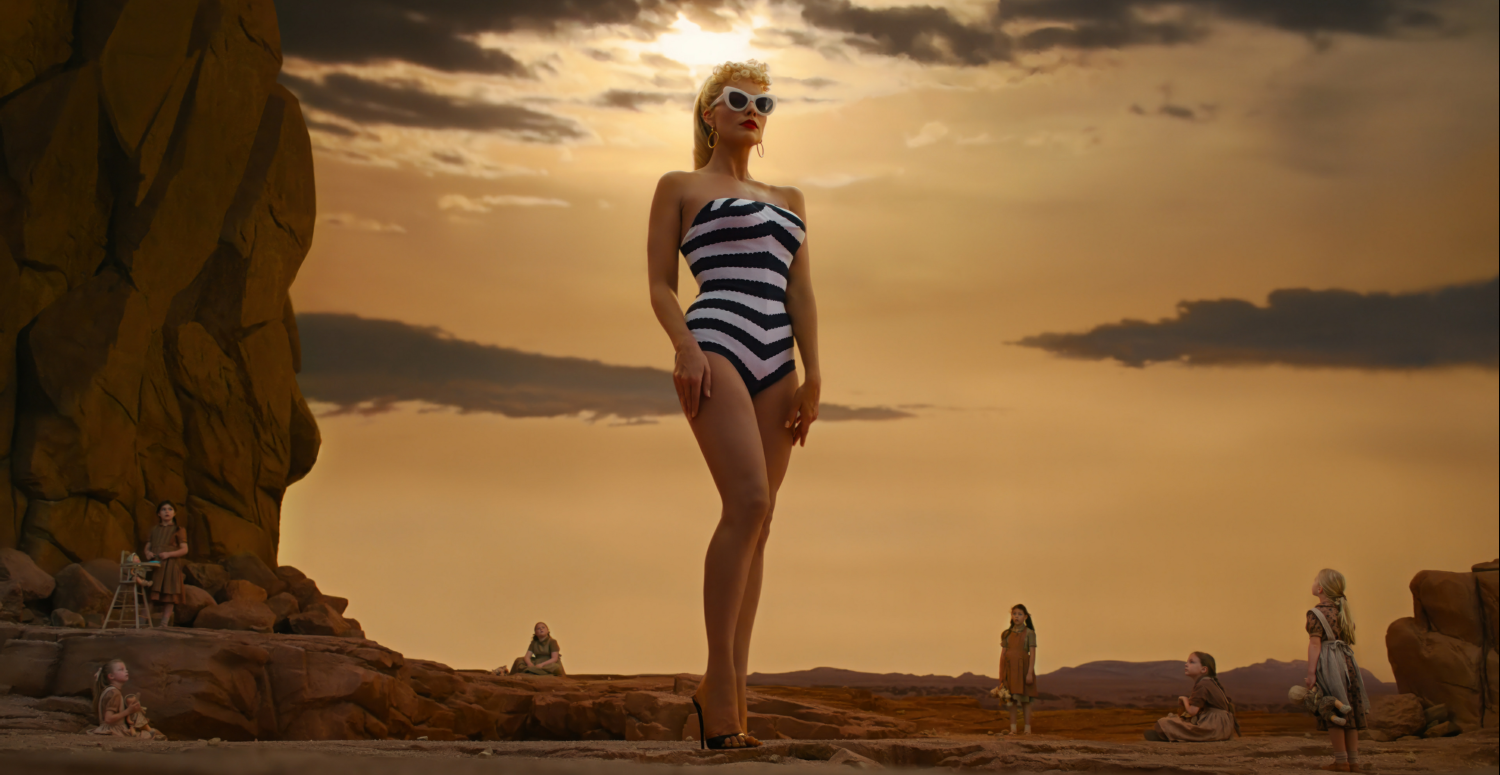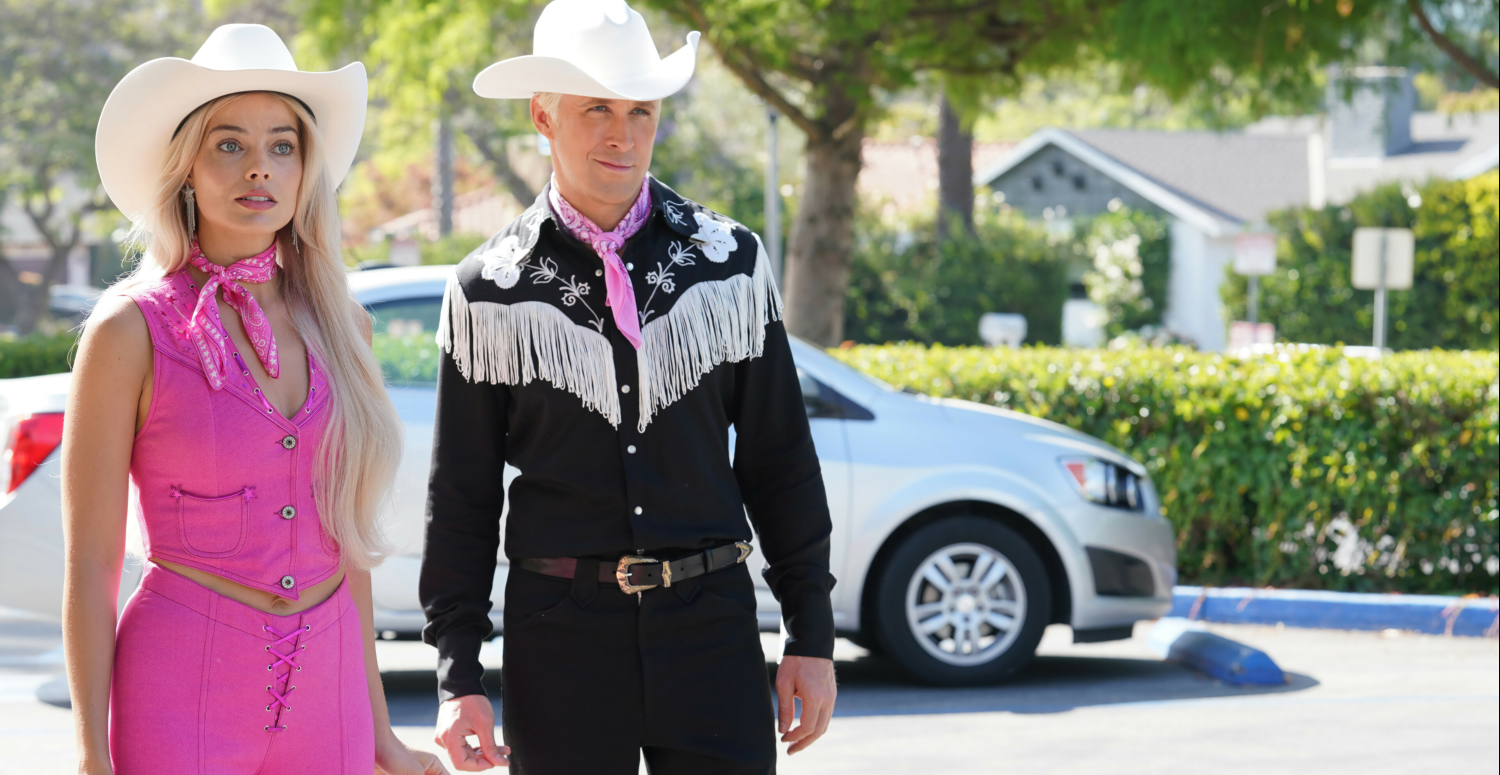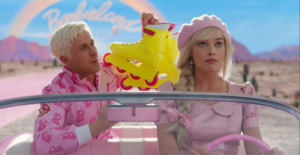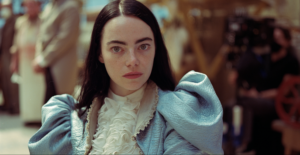Barbie
[Dossier]
Best Original Song – Oscars
Best Original Song – WSA
Best Compilation Soundtrack – Grammy
Movie of the year – People’s Choice Award
Comedy of the year – People’s Choice Award
2023

FR EN
Le Succès de l’Année ?
Plus d’un mois après sa sortie en salles, le phénomène de l’été continue sa course effrénée vers le trône du box-office annuel mondial. Sorti le 19 juillet simultanément avec « Oppenheimer », le film a profité de ce qu’on a depuis appelé le ‘Barbenheimmer’ : ce marketing poussé par les stars (de Margot Robbie à Christopher Nolan en passant par Tom Cruise qui sortait son dernier « Mission Impossible » seulement une semaine avant et s’est fait engloutir par le phénomène) prônant un retour en salles pour tous avec deux films portés par des auteurs aux styles et tons bien différents. Les deux films passaient alors du statut de concurrents à équipiers dans cette vaste opération menée par Warner et Universal (et par extension Paramount qui en a fait les frais).
Mais c’est bien « Barbie » qui a remporté cette amicale compétition et de loin en marchant (talons ou sans talons) littéralement sur la concurrence. C’est un film qui a fait beaucoup parler, engendré beaucoup de curiosité et dont nous avons d’ailleurs déjà publié deux critiques divergentes. C’est une œuvre d’un féminisme post-metoo portée par Margot Robbie, célèbre effigie et sex-symbol d’Hollywood. L’actrice australienne révélée dans « Le Loup de Wall Street » s’est depuis forgé une place de choix dans l’industrie du cinéma américaine tournant avec de grands noms (Once upon a time in Hollywood ; Babylon ; Amsterdam ; Asteroid City) et nommé aux Oscars pour « Moi, Tonya ». Elle s’engage dorénavant avec des films tels que « Scandale » ou « Promising Young Woman » qu’elle a produit via sa société LuckyChap Entertainment.
Le projet de film « Barbie » était depuis longtemps dans les cartons de la société mère de la célébrissime poupée Mattel avec un film initialement produit par Sony et porté par l’actrice et humoriste américaine Amy Schumer avant que celle-ci ne quitte le projet en 2016 dû à un scénario pas assez drôle et féministe à son goût. Margot Robbie racheta alors les droits et engagea Greta Gerwig (Les Filles du Docteur March ; Lady Bird) et Noah Baumbach (Marriage Story ; Frances Ha) pour réécrire le scénario. Le projet migra alors chez Warner et fut également réalisé par Greta Gerwig avec Margot Robbie dans le rôle principal aux côtés d’un excellent Ryan Gosling dans le rôle de Ken.
De la poupée née dans les années 1960, l’actrice et productrice du film en a la blondeur et la plastique, mais elle n’y joue certainement pas la femme-objet. « Barbie » questionne plutôt le patriarcat avec ironie à travers un récit totalement caricatural et décalé dans une ambiance clairement trop rose pour être premier degré. C’est une œuvre qui porte un concept, une idée forte et bien pensée où les décors de jouets construits en réel et le retour à d’anciennes techniques de tournage renforcent l’aspect ‘fake’ du monde de Barbie. S’il manque fortement de subtilité à mon goût en nous soulignant à gros trait son message, le film réussit pourtant un brillant prologue reproduisant plans-pour-plans celui de « 2001 : l’odyssée de l’espace » dans un ton plus symbolique et métaphysique que le reste de l’intrigue. Bourré de références aux mondes du grand et petit écrans, « Barbie » c’est avant tout une comédie qui fait rire grâce à ses comiques de situation et ses allusions. Si Kingsley Ben-Adir démontre une nouvelle flèche à son arc avec un rôle de Ken comique, dans l’ensemble, le casting secondaire est grandement délaissé sans véritable rôle dans l’intrigue et presque relégué à une fonction marketing avec sa galerie de stars et célébrités.

« Barbie » divise grandement, et ce en grande partie pour une affaire de générations. Autant dans les références que dans la nature du message, c’est plus un film pour jeunes mais il a néanmoins attiré un très large public et c’est une des raisons de son impressionnant succès au box-office américain et également mondial.
Si vous regardez les prédictions annuelles de box-office, « Barbie » n’était jamais dans le top 10, ni américain, ni mondial. Mais cet été a d’abord été celui de toutes les désillusions pour les blockbusters américains (Fast X ; Transformers ; The Flash ; Indiana Jones ; Elémentaire ; Mission Impossible), la faute déjà à des budgets astronomiques, à une certaine fatigue de formule probablement et à d’autres raisons conjoncturelles. Mais le fait est que les grands favoris n’étaient pas là où on pouvait les attendre cet été. C’est dans ce contexte – et une semaine après la sortie de « Dead Reckoning » qui a alors perdu toutes ses projections IMAX et DOLBY – que « Barbie » et « Oppenheimer » sortent.
Evidemment, la poupée rose réalise un meilleur démarrage que le père de la bombe atomique bénéficiant d’une immense notoriété, d’une plus grande star en tête d’affiche, d’une durée plus abordable (2h vs 3h), d’une classification plus favorable (PG-13 vs R-rated), d’un intérêt probablement plus large et d’un ton sympathique plus en accord avec les conventionnels divertissements estivaux. Mais les deux films explosent les prévisions et réalisent en équipe le meilleur week-end d’Hollywood depuis fort longtemps (4e meilleur box-office cumulé de l’Histoire). Depuis « Barbie » a pris les devants et a gravi un à un les records, devenant le meilleur film réalisé par une femme en solo (toujours derrière « La Reine des Neiges 2 » s’il l’on compte les coréalisations) dépassant ainsi « Captain Marvel ». Il est également devenu le meilleur succès de toute l’histoire du studio Warner devant « Harry Potter 8 » (compensant quelque peu les récents déboires des films DC). « Oppenheimer », premier film de Nolan après son départ justement de Warner, obtient quant à lui l’étonnant record de box-office ($777M) sans jamais avoir été N°1 du classement hebdomadaire du fait de sa sortie concomitante avec « Barbie » dont il aura à la fois souffert mais aussi bénéficié.
C’est simple, ce dernier est sans conteste le plus grand succès de l’été et s’avère très bien parti pour devenir le film le plus rentable de l’année ! Il ne lui reste plus que « Super Mario Bros. » et ses 1,36 milliards de dollars de recettes mondiales à dépasser, ce qui devrait être le cas d’ici la semaine prochaine. La poupée de Mattel cumule actuellement un total de 1,34 milliards de dollars de recettes mondiales (actuellement 3e en France avec déjà 5 millions d’entrées) et pourrait bien prendre et conserver le trône jusqu’à la fin d’année. En effet, après les échecs des blockbusters estivaux, la concurrence à laquelle fera face « Barbie » s’avère limitée (sauf immense surprise) avec « Aquaman 2 » (mais en ce moment DC est plutôt en train de couler tout droit vers son Atlantis), « The Marvels » (le premier « Captain Marvel » avait déjà passé la barre du milliard de recettes), et « Dune : Partie II » (le premier était bien loin de ces chiffres mais avait souffert du COVID et de la politique de sortie simultanée en streaming de Warner, il est donc difficile de prédire les chiffres de cette suite tant attendue mais par combien de spectateurs ?). « Barbie » semble ainsi avoir bel et bien renversé – si ce n’est le monde réel – celui d’Hollywood et de ses succès estivaux…
Raphaël Sallenave
Hit of the year?
More than a month after its theatrical release, the hit of the summer continues its frantic race to the throne of the annual worldwide box-office. Released on July 19 alongside “Oppenheimer”, the film enjoyed what has since been dubbed the « Barbenheimmer »: this star-driven marketing (from Margot Robbie to Christopher Nolan as well as Tom Cruise, who released his latest “Mission Impossible” only one week before and was swallowed up by the phenomenon) promoted a return to cinemas for all with two films written and directed by auteurs with very different styles and tones. The two movies went from being competitors to teammates in this vast operation led by Warner and Universal (and by extension Paramount, which paid the price).
But “Barbie” did win this friendly competition by a mile, literally walking all over (with heels or not) the competition. It’s a film that has generated a lot of buzz and curiosity, and of which we’ve already published two divergent reviews. It’s a post-metoo feminist movie starring Margot Robbie, the famous Hollywood icon and sex symbol. The Australian actress, who first made a name for herself in “The Wolf of Wall Street”, has since forged a solid career for herself in the American film industry, working with some of the biggest names (Once upon a time in Hollywood; Babylon; Amsterdam; Asteroid City) and earning an Oscar nomination for “I, Tonya”. She is now getting involved with more militant movies such as “Bombshell” and “Promising Young Woman”, which she produced via her company LuckyChap Entertainment.
The “Barbie” project had long been in the pipeline for the parent company of the famous doll, Mattel, with a film initially produced by Sony and starring American actress and comedian Amy Schumer, before she left the project in 2016 due to a script that wasn’t funny and feminist enough for her taste. Margot Robbie then acquired the rights and hired Greta Gerwig (Little Women; Lady Bird) and Noah Baumbach (Marriage Story; Frances Ha) to rewrite the script. The project then moved to Warner and Greta Gerwig took over as director, with Margot Robbie in the lead role and an excellent Ryan Gosling as Ken.
The actress and producer of the movie has all the blonde hair and plasticity of the doll born in the 1960s, but she certainly doesn’t play the character as a woman-object. Instead, “Barbie” questions patriarchy with irony, through a story that’s totally cartoonish and offbeat, in a mood clearly too pink to be literal. It’s a concept-driven work, with a strong, well-thought-out idea, where the real-life toy sets and the return to old-fashioned filming techniques add to the ‘fake’ aspect of Barbie’s world. Although the film lacks subtlety in the way it conveys its message, it does achieve a brilliant prologue that reproduces shot-for-shot that of “2001: A Space Odyssey”, in a tone more symbolic and metaphysical than the rest of the plot. Packed with references to the worlds of the big and small screens, “Barbie” is above all a comedy that makes you laugh thanks to its situational comedy and funny easter eggs. While Kingsley Ben-Adir demonstrates a new feather in his cap with a hilarious role as Ken, overall, the supporting cast is largely neglected, with no real part in the plot and almost relegated to a marketing role with its galaxy of stars and celebrities.

This is a highly divisive film, and largely a matter of generations. As much in the references as in the substance of its message, it is more targeted for young people, but has nonetheless attracted a very wide audience, and that’s one of the reasons behind its spectacular success both at the U.S. and worldwide box-office.
If you look at the annual box-office forecasts, « Barbie » was never in the top 10, either in the U.S. or worldwide. But this summer was first and foremost one of disappointment for American blockbusters (Fast X; Transformers; The Flash; Indiana Jones; Elemental; Mission Impossible), the blame being first their staggering budgets, then a certain degree of formula fatigue, and most likely a number of other factors. But the fact remains that the big favorites weren’t where you’d expect them to be this summer. So, that’s the context when “Barbie” and “Oppenheimer” were released, only a week after the release of “Dead Reckoning”, which then lost all its IMAX and DOLBY screenings.
Obviously, the pink doll got off to a better start than the father of the atomic bomb, benefiting from its huge fame, bigger headlining star, more affordable running time (2h vs. 3h), more accessible rating (PG-13 vs. R-rated), probably wider interest and a friendly tone more in line with traditional summer entertainment. But the two films did blow away forecasts and, as a pair, achieved Hollywood’s best weekend in a very long time (4th best aggregate box-office in history). Since then, “Barbie” has taken the lead and broken records one by one, becoming the best solo female-directed film (still behind “Frozen 2” if you count co-directions) ahead of “Captain Marvel”. It is also on track to become the most successful film in Warner studio history, currently just behind “Harry Potter 8” (somewhat making up for the recent setbacks of the DC movies). “Oppenheimer”, by the way, Nolan’s first film after his departure from Warner, achieves the astonishing box-office record ($757M) without ever having been No. 1 in the weekly chart, due to its concomitant release with “Barbie”, from which it both suffered and benefited.
Quite simply, the latter is unquestionably the summer’s biggest hit and is well on its way to becoming the top grossing film of the year! All it has left to do is beat “Super Mario Bros.” and its $1.36 billion worldwide gross, which should be done by next week. The Mattel doll is currently racking up a total of $1.34 billion in worldwide ticket sales (currently 3rd in France, with already 5 million admissions), and could well take and hold the throne until the end of the year. Indeed, after the failures of the summer blockbusters, the competition “Barbie” will be facing is limited (unless huge surprise) with “Aquaman 2” (but at the moment DC is rather sinking straight to its Atlantis), “The Marvels” (the first “Captain Marvel” did already cross the billion dollar mark), and “Dune: Part II” (the first was nowhere near these figures, but suffered from COVID and Warner‘s day-and-date release strategy, so it’s hard to estimate how many people will actually watch this eagerly-awaited sequel?). “Barbie” therefore seems to have really turned, if not the real world, rather the Hollywood one and its summer hits upside down…
Raphaël Sallenave

